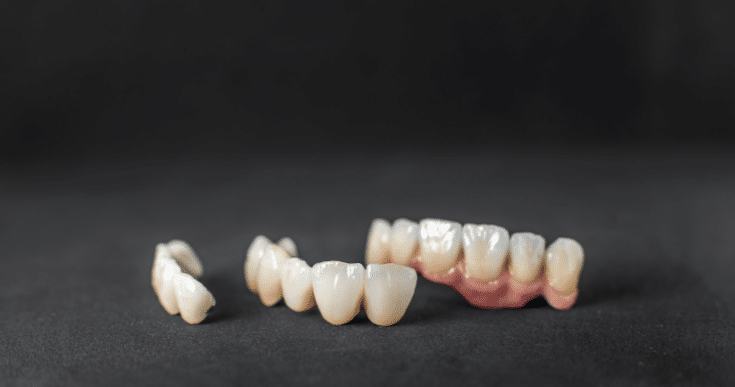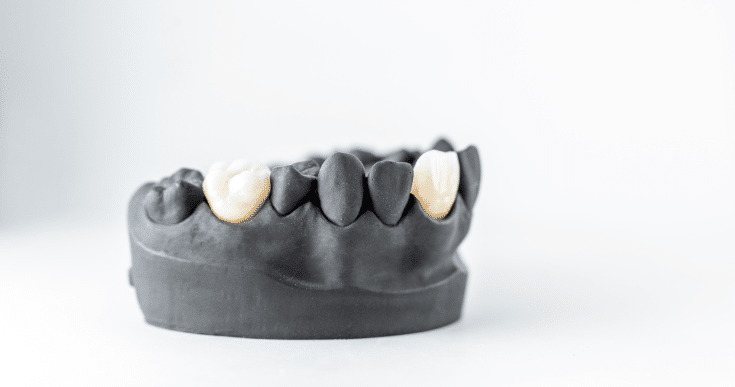
Do you need clarification about the differences between crowns and bridges when it comes to your dental health? You’re not alone! These two procedures are often used interchangeably, but they serve very different purposes. Crowns and bridges can both improve the function and aesthetics of your teeth, but their methods and applications differ. In this blog post, we’ll break down everything you need to know about crowns vs. bridges so that you can make an informed decision about which one is right for you. Let’s dive in!
Crowns
Crowns are dental restorations used to cover or cap a damaged tooth. They can be made of various materials such as porcelain, metal, or a combination of both. The purpose of crowns is to improve the tooth’s appearance and protect it from further damage.
One common reason for needing a crown is if you have a large cavity that cannot be filled with a regular filling. In this case, the dentist will remove the decayed portion of the tooth and place a crown over it to provide protection and strength.
Another reason for getting a crown may be due to an injury or accident that has caused significant damage to your tooth. Crowns can restore teeth to their original shape and functionality while also improving their appearance.
Crowns are custom-made for each patient, so they fit perfectly in your mouth and look natural alongside your other teeth. With proper care and maintenance, crowns can last many years without needing replacement.
Dental Crown treatments are an effective solution for restoring damaged teeth while also improving their aesthetic appearance. If you have concerns about the health or appearance of one or more teeth, talk with your dentist about whether crowns may be right for you.
Bridges
Bridges are a dental restoration solution that replaces one or more missing teeth. They consist of two crowns attached to either end of the bridge, with artificial teeth in between them. The crowns attach to the natural teeth on either side of the gap, anchoring the bridge.
One benefit of bridges is that they can improve your bite and chewing ability by filling in gaps left by missing teeth. This can also prevent surrounding teeth from drifting out of position due to space created by missing teeth.
Another advantage is that bridges can enhance your smile and boost your self-confidence since they look and function like natural teeth. Bridges are typically made from porcelain or ceramic material, which provides a close match to your natural tooth color.
However, there are some drawbacks to consider when it comes to bridges. For example, they require healthy supporting teeth nearby for attachment purposes as well as regular cleaning routines around the area where it’s attached so gum disease doesn’t occur.
If you’re looking for a durable and long-lasting option for replacing missing teeth while promoting good oral health habits at home then dental Bridges treatment might be right for you!
Benefits Of Crowns
Crowns, also known as caps, are dental restoration that covers the entire tooth. They are often used to restore damaged or decayed teeth that cannot be repaired with a filling alone.
One benefit of crowns is their durability. Crowns can last up to 15 years with proper care and maintenance. They are made from materials such as porcelain, ceramic, or metal alloys that are strong and resistant to wear.
Another advantage of crowns is their versatility. They can be used for both functional and cosmetic purposes. In addition to restoring strength and function to a damaged tooth, they can also improve its appearance by correcting discoloration or misalignment.
Crowns also protect weakened teeth. Teeth undergoing extensive work such as root canal therapy may become brittle over time and more susceptible to cracking or breaking under pressure. A crown acts as a shield, providing added strength and support.
Crowns offer an effective solution for those who grind their teeth at night (bruxism). The constant grinding puts excessive stress on the teeth which could lead to cracks or fractures over time; however, placing crowns helps in avoiding this damage.
Overall, crowns offer several benefits including durability, versatility, protection against further damage, and suitability for patients with bruxism among others making them an excellent option for many dental patients needing restorative work done on their teeth.
Benefits Of Bridges
Bridges are an excellent option for those who have missing teeth. Not only do they help restore the appearance of your smile, but they also offer several benefits that can improve your dental health.
One significant advantage of bridges is that they prevent surrounding teeth from shifting out of place. When a tooth is lost, the adjacent teeth can begin to move into the gap left behind. This movement can cause misalignment and bite issues over time, making it more challenging to eat and speak properly.
Another benefit of bridges is that they distribute chewing forces evenly throughout your mouth. A gap in your teeth can create additional pressure on other nearby teeth when you chew or bite down on food. Bridges help distribute this pressure across multiple teeth, reducing wear and tear over time.
Since bridges fill gaps between missing teeth, they also promote better oral hygiene by preventing food particles from getting trapped in hard-to-reach places along the gumline. This helps lower the risk of developing gum disease or tooth decay in these areas.
If you’re looking for a reliable solution to replace missing teeth with long-lasting results and improved functionality without surgery or implants then bridges may be the right choice for you!
Which Is Better For Your Teeth?
When it comes to deciding between crowns and bridges for your teeth, the answer is not one-size-fits-all. Each option has its unique benefits and drawbacks depending on the individual’s situation.
Firstly, if you are looking to protect a weak or damaged tooth, a crown may be the better option. Crowns cover the entire tooth like a cap, providing additional strength and protection against further damage.
On the other hand, if you have missing teeth that need replacement, a bridge may be more appropriate. Bridges use adjacent teeth as anchors and fill in gaps with artificial teeth.
It’s important to consider factors such as cost, durability, and maintenance when making your decision. While crowns tend to last longer than bridges, they can also be more expensive.
Additionally, maintaining good oral hygiene practices is essential for both options. Regular brushing and flossing will help extend the lifespan of either crown or bridge.
Ultimately, consulting with your dentist about which option is best suited for your specific needs will ensure optimal dental health in the long run.
Bottom Line
After understanding the differences between crowns and bridges, it’s clear that both options have their unique benefits. Crowns are ideal for repairing damaged teeth or protecting them after a root canal while bridges are great for replacing missing teeth.
When deciding which treatment is best for you, it’s important to consult with your dentist who can recommend the most appropriate option based on your specific needs. With proper care and maintenance, both crowns and bridges can last several years and help improve your oral health.
Ultimately, investing in either of these treatments is an investment in your overall well-being as they not only enhance the appearance of your smile but also ensure that you can chew properly and speak clearly. So don’t hesitate to reach out to your dentist today and take the next step towards better dental health.




